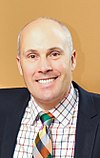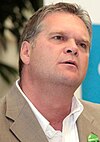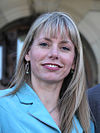Alberta Party: Difference between revisions
No edit summary |
Cyberbot II (talk | contribs) Rescuing 1 sources, flagging 0 as dead, and archiving 1 sources. #IABot |
||
| Line 45: | Line 45: | ||
After the rise of the [[Wildrose Alliance]] as Alberta's main right-wing alternative to the governing Progressive Conservatives, the right-wing members of the Alberta Party left to join that party. This left a small rump of centrists in control of the party. In 2009, former [[Alberta Greens]] deputy leader [[Edwin Erickson (Alberta politician)|Edwin Erickson]], who had been organizing a new "Progress Party", was invited to run as a leadership candidate for the Alberta Party and won by acclamation. In 2010 the Alberta Party board voted to merge with Renew Alberta, a progressive and centrist group that had been organizing to form a new political party.<ref name=autogenerated1 /> |
After the rise of the [[Wildrose Alliance]] as Alberta's main right-wing alternative to the governing Progressive Conservatives, the right-wing members of the Alberta Party left to join that party. This left a small rump of centrists in control of the party. In 2009, former [[Alberta Greens]] deputy leader [[Edwin Erickson (Alberta politician)|Edwin Erickson]], who had been organizing a new "Progress Party", was invited to run as a leadership candidate for the Alberta Party and won by acclamation. In 2010 the Alberta Party board voted to merge with Renew Alberta, a progressive and centrist group that had been organizing to form a new political party.<ref name=autogenerated1 /> |
||
During the merger process, the party's board agreed to suspend its old policy platform and start anew. To create a new platform different from its more right-wing history, in 2010 the party launched a campaign called "The Big Listen" in order to canvass the public for new policy ideas.<ref>{{cite web|author=daveberta on February 21, 2010 |url=http://daveberta.ca/?p=2249 |title=breakfast with the new alberta party. | Breakfast with the new Alberta Party |publisher=Daveberta.ca |date=February 21, 2010 |accessdate=April 14, 2012}}</ref><ref>{{cite web|url=http://www.ffwdweekly.com/article/news-views/news/coming-soon-to-a-living-room-near-you-5334/ |title=FFWD – The Alberta Party coming soon to a living room near you |publisher=Ffwdweekly.com |date=March 13, 2010 |accessdate=April 14, 2012}}</ref> The party held its first policy convention on November 13 and 14, 2010 to develop substantive policies from the ideas heard during the Big Listen. At the convention, Erickson stepped down to make way for an acting leader until a leadership contest could be held. A first set of policies was released on November 23, 2010, to coincide with the announcement of the appointment of an acting leader, [[Sue Huff]]. These policies centred on five key areas: economy, health, environment, democratic renewal and education.<ref>[http://www.albertaparty.ca/2010/11/alberta-party-announces-acting-leader-and-releases-first-policies-to-albertans/ Alberta Party announces Acting Leader and releases first policies to Albertans]{{ |
During the merger process, the party's board agreed to suspend its old policy platform and start anew. To create a new platform different from its more right-wing history, in 2010 the party launched a campaign called "The Big Listen" in order to canvass the public for new policy ideas.<ref>{{cite web|author=daveberta on February 21, 2010 |url=http://daveberta.ca/?p=2249 |title=breakfast with the new alberta party. | Breakfast with the new Alberta Party |publisher=Daveberta.ca |date=February 21, 2010 |accessdate=April 14, 2012}}</ref><ref>{{cite web|url=http://www.ffwdweekly.com/article/news-views/news/coming-soon-to-a-living-room-near-you-5334/ |title=FFWD – The Alberta Party coming soon to a living room near you |publisher=Ffwdweekly.com |date=March 13, 2010 |accessdate=April 14, 2012}}</ref> The party held its first policy convention on November 13 and 14, 2010 to develop substantive policies from the ideas heard during the Big Listen. At the convention, Erickson stepped down to make way for an acting leader until a leadership contest could be held. A first set of policies was released on November 23, 2010, to coincide with the announcement of the appointment of an acting leader, [[Sue Huff]]. These policies centred on five key areas: economy, health, environment, democratic renewal and education.<ref>[http://www.albertaparty.ca/2010/11/alberta-party-announces-acting-leader-and-releases-first-policies-to-albertans/ Alberta Party announces Acting Leader and releases first policies to Albertans] {{wayback|url=http://www.albertaparty.ca/2010/11/alberta-party-announces-acting-leader-and-releases-first-policies-to-albertans/ |date=20120301160445 }}</ref> On January 24, 2011, former Liberal MLA [[Dave Taylor (Canadian politician)|Dave Taylor]] announced he was joining the Alberta Party, becoming the party's first MLA.<ref>[http://www.albertaparty.ca/2011/01/dave-taylor-mla-calgary-currie-joins-alberta-party/ Dave Taylor, MLA for Calgary Currie joins the Alberta Party]{{dead link|date=April 2012}}</ref> |
||
===2011 leadership election=== |
===2011 leadership election=== |
||
Revision as of 17:54, 9 February 2016
Template:Infobox Canadian political party
The Alberta Party, formally known as the Alberta Party Political Association, is a political party in the province of Alberta, Canada. The party describes itself as a centrist and pragmatic party that is not dogmatically ideological in its approach to politics.[1][2]
For most of its history the Alberta Party was a right-wing organization, until the rise of the Wildrose Alliance as Alberta's main conservative alternative to the governing Progressive Conservatives attracted away the Alberta Party's more conservative members. This left a small rump of more left-wing members in control of the Alberta Party. In 2010 the Alberta Party board voted to merge with Renew Alberta, a progressive group that had been organizing to form a new political party in Alberta.[3] The Alberta Party thus shed its conservative past for a more centrist political outlook. The party has been cited in The Globe and Mail[4] and The Economist[5] as part of the break in one-party politics in Alberta.
History
Early history
The Alberta Party began in the early 1980s as an alliance of small separatist political parties. The right side of Alberta's political spectrum was fragmented by parties spawned in the wake of the National Energy Program and feelings that Premier Peter Lougheed had done little to prevent the economic collapse it allegedly had caused. Some of these parties had already achieved some small success in attaining seats in the Legislative Assembly of Alberta, though in the 1982 general election Social Credit, the Alberta Reform Movement and the Western Canada Concept lost their representation in the Legislature. The Heritage Party of Alberta, Representative Party of Alberta and the Confederation of Regions had been founded in the preceding years, which made for a total of five parties to the right of the Progressive Conservatives in 1985.
On October 30, 1990 this alliance of parties gave way to the creation of a new political party, the Alliance Party of Alberta.[6] This change marked a transition away from trying to build a coalition of parties to full participation in electoral politics. The party participated in two by-elections, and fielded a handful of candidates in the 1993 general election but received only a small percentage of the popular vote in each case.[7] The party did not contest the 1997 provincial election.[8]

In 1998, the Alliance Party followed the example of the Saskatchewan Party and the Manitoba Party by changing its name to the Alberta Party Political Association, or the Alberta Party for short.[9]
Shortly before the 2004 election, the Alberta Party attempted to merge with the Alberta Alliance Party (a different organization from the old Alliance Party of Alberta). The merged party would have adopted the Alberta Party platform, and the Alberta Party provincial council would have had seats on the Alberta Alliance Provincial Council. The deal fell through because the Alberta Party would not agree to de-register the Alberta Party name with Elections Alberta.[citation needed] On October 1, 2004 shortly before the general election, the party shortened its registered name to "Alberta Party" from "the Alberta Party Political Association".[10]
In the 2004 provincial election, the party nominated candidates in four ridings, winning a total of 2,485 votes, or 0.3% of the provincial total. The party fielded one candidate, Margaret Saunter, for the March 3 2008 provincial election. Saunter placed last out of a field of six candidates in Edmonton-Centre.
Ideological shift and party renewal

After the rise of the Wildrose Alliance as Alberta's main right-wing alternative to the governing Progressive Conservatives, the right-wing members of the Alberta Party left to join that party. This left a small rump of centrists in control of the party. In 2009, former Alberta Greens deputy leader Edwin Erickson, who had been organizing a new "Progress Party", was invited to run as a leadership candidate for the Alberta Party and won by acclamation. In 2010 the Alberta Party board voted to merge with Renew Alberta, a progressive and centrist group that had been organizing to form a new political party.[3]
During the merger process, the party's board agreed to suspend its old policy platform and start anew. To create a new platform different from its more right-wing history, in 2010 the party launched a campaign called "The Big Listen" in order to canvass the public for new policy ideas.[11][12] The party held its first policy convention on November 13 and 14, 2010 to develop substantive policies from the ideas heard during the Big Listen. At the convention, Erickson stepped down to make way for an acting leader until a leadership contest could be held. A first set of policies was released on November 23, 2010, to coincide with the announcement of the appointment of an acting leader, Sue Huff. These policies centred on five key areas: economy, health, environment, democratic renewal and education.[13] On January 24, 2011, former Liberal MLA Dave Taylor announced he was joining the Alberta Party, becoming the party's first MLA.[14]
2011 leadership election
The party announced in January 2011 that a leadership convention would be held in Edmonton on May 28, 2011.[15] Four candidates contested the leadership of the party: Glenn Taylor, mayor of Hinton; Tammy Maloney, a social entrepreneur; businessman Randy Royer;[16] and Lee Easton, chair of the English program at Mount Royal University.[17] Chris Tesarski, CEO of Sandbox Energy Corporation, was also a candidate early in the contest,[18] but on April 15 announced he would not seek the party's leadership, citing disagreements with some aspects of the party's philosophy and some party members' attitudes towards his candidacy.[19] Dave Taylor, the party's only MLA, was also expected to run for the leadership,[20] but did not join the campaign. At the convention, the election was decided on the first ballot when Glenn Taylor won just over 55% of the votes.[21][22]
2012 Alberta general election
The party nominated 38 candidates to run in the 28th Alberta general election.[23] None were elected.
2013 leadership election
After Glenn Taylor stepped down on September 22, 2012, the party remained without a leader for some months. On May 29, 2013, the party announced that it would be holding a leadership vote to coincide with its Annual General Meeting on September 21, 2013 in Edmonton.[24] Entrepreneur and 2012 Calgary-Elbow election candidate Greg Clark, and self-employed consultant and 2012 Calgary-North West candidate Troy Millington, sought the leadership.[25] Clark won the election, receiving 87% of the 337 votes cast.[26]
Leaders
| Picture | Name | Start | Finish | Notes |
|---|---|---|---|---|

|
Greg Clark | September 21, 2013 | Present | After remaining leaderless for a year, the party elected Clark at a convention in Edmonton. |

|
Glenn Taylor | May 28, 2011 | September 22, 2012 | Elected at a convention in Edmonton; stepped down after failing to win a seat in the 2012 Alberta general election. |

|
Sue Huff | November 23, 2010 | May 28, 2011 | Interim leader. |
| Edwin Erickson | January 28, 2010 | November 22, 2010 | Leader for merger with Renew Alberta. | |
| Robert Leddy | 2009 | January 28, 2010 | First leader of the ideological shift. | |
| Bruce Stubbs | 2004 | 2009 | ||
| George Flake | 2001 | 2004 | Second time as leader. | |
| Fred Schorning | 1999 | 2001 | ||
| George Flake | 1997 | 1999 | ||
| Mark Waters | 1993 | 1997 | ||
| Howard Thompson | 1986 | 1993 |
Election results
2015 general election
| Party | Party leader | Number of candidates |
Seats | Popular vote* | ||||||
|---|---|---|---|---|---|---|---|---|---|---|
| 2012 | Dissol. | 2015 | % of Seats | # | % | Change (pp) | ||||
| New Democratic | Rachel Notley | 87 | 4 | 4 | 54 | 62.1 | 603,459 | 40.59 | +30.77 | |
| Wildrose | Brian Jean | 86 | 17 | 5 | 21 | 24.1 | 360,124 | 24.22 | -10.07 | |
| Progressive Conservative | Jim Prentice | 87 | 61 | 70 | 9 | 10.3 | 412,958 | 27.77 | –16.18 | |
| Liberal | David Swann | 56 | 5 | 5 | 1 | 1.1 | 62,171 | 4.18 | –5.71 | |
| Alberta Party | Greg Clark | 36 | — | - | 1 | 1.1 | 33,867 | 2.28 | +0.95 | |
| Green[28] | Janet Keeping | 24 | — | — | — | — | 7,321 | 0.49 | +0.10 | |
| Social Credit | Len Skowronski | 6 | — | — | — | — | 832 | 0.06 | +0.04 | |
| Communist | Naomi Rankin | 2 | — | — | — | — | 181 | 0.01 | = | |
| Alberta First[29] | Bart Hampton | 1 | — | — | — | — | 72 | 0.005 | = | |
| Independent | 15 | — | 1 | — | - | 5,916 | 0.40 | +0.13 | ||
| Vacant | 2 | 1** | 1.1 | |||||||
| Total | 400 | 87 | 87 | 87 | 100.0% | 1,486,901 | 100.00% | |||
- * The total popular vote includes votes from voided Calgary-Foothills election.
- ** The candidate elected for Calgary-Foothills, Jim Prentice, disclaimed his victory.[30] According to section 139 of the Alberta Elections Act,[31] if a winning candidate disclaims their right to become an MLA before the end of the appeal period for the official results, that riding's election is declared void.
2012 general election
Template:Alberta general election, 2012
Before 2012
| Banner | Election | Date | Candidates | Seats | Vote | % Province | % Riding |
|---|---|---|---|---|---|---|---|
| Alliance Party | Little Bow by-election | March 5, 1992 | 1 | 0 | 399 | 7.14% | |
| Three Hills by-election | October 26, 1992 | 1 | 0 | 566 | 5.47% | ||
| 1993 general election | 4 | 0 | 3,548 | 0.36% | |||
| Alberta Party | 2001 general election | Coalition with Social Credit[32] | |||||
| 2004 general election | November 22, 2004 | 4 | 0 | 2,485 | 0.30% | ||
| 2008 general election | March 3, 2008 | 1 | 0 | 51 | 0.01% | ||
References
- ^ "About the Alberta Party". Alberta Party. Retrieved April 7, 2011.
- ^ Kolafa, Pat (February 11, 2011). "Alberta Party talks policy with Drumheller Councillors". Drumheller Mail. Retrieved April 7, 2011.
- ^ a b http://www.renewalberta.ca/ Archived 2010-06-20 at the Wayback Machine
- ^ Simpson, Jeffrey (February 2, 2011). "Alberta's one-party system is cracking up". Globe and Mail. Toronto.
- ^ "Prairie fire: A split in Canada's most powerful right-wing political machine". The Economist. January 27, 2011.
- ^ Thirteenth Annual Report of the Chief Electoral Officer of Alberta. Elections Alberta. 1991.
- ^ "Calgary Currie Official Election Results 1993". Alberta Heritage. Retrieved March 22, 2008.
- ^ "1997 Alberta Provincial General Election Information". Elections Alberta. February 25, 1997. Retrieved July 6, 2008.
- ^ Nineteenth Annual Report of the Chief Electoral Officer of Alberta. Elections Alberta. 1999.
- ^ "28th Annual Report of the Chief Electoral Officer" (PDF). Elections Alberta. 2004. p. 2.
- ^ daveberta on February 21, 2010 (February 21, 2010). "breakfast with the new alberta party. | Breakfast with the new Alberta Party". Daveberta.ca. Retrieved April 14, 2012.
{{cite web}}: CS1 maint: numeric names: authors list (link) - ^ "FFWD – The Alberta Party coming soon to a living room near you". Ffwdweekly.com. March 13, 2010. Retrieved April 14, 2012.
- ^ Alberta Party announces Acting Leader and releases first policies to Albertans Archived 2012-03-01 at the Wayback Machine
- ^ Dave Taylor, MLA for Calgary Currie joins the Alberta Party[dead link]
- ^ Alberta Party kicks off leadership race[dead link]
- ^ http://www.randyroyer.com/ Randy Royer
- ^ http://www.leeeaston.ca/ Lee Easton
- ^ Oil exec to run for Alberta Party leadership [dead link]
- ^ Chris Tesarski (April 15, 2011). "I Love Alberta". Christesarski.blogspot.com. Retrieved April 14, 2012.
- ^ Braid: Ex-Liberal Calgary MLA Dave Taylor to join Alberta Party [dead link]
- ^ @midgelambertBRW (April 10, 2012). "Leadership election results announced". Albertaparty.ca. Retrieved April 14, 2012.
- ^ Hinton mayor elected first Alberta Party Leader[dead link]
- ^ "Alberta Party 2012 election candidates". Albertaparty.ca. Retrieved April 14, 2012.
- ^ "Alberta Party announces Leadership Race". AlbertaParty.ca. Retrieved May 29, 2013.
- ^ "Two candidates vie for Alberta Party leadership". Calgary Herald. Retrieved September 18, 2013.
- ^ "Alberta Party elects new leader". Global News. Retrieved March 5, 2014.
- ^ "Unofficial Results". Retrieved July 18, 2015.
- ^ Results compared to the Evergreen Party's results in 2012
- ^ Results compared to the Separation Party's results in 2012
- ^ Office of the Chief Electoral Officer (June 5, 2015). "Notice: Members Elected to Serve in the Legislative Assembly of Alberta". The Alberta Gazette, Part I. 111 (11): 391.
- ^ RSA 2000, c E-1
- ^ "Political parties to merge". CBC News. February 7, 2000. Retrieved May 29, 2011.

